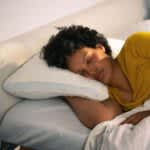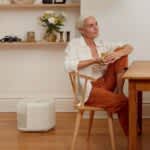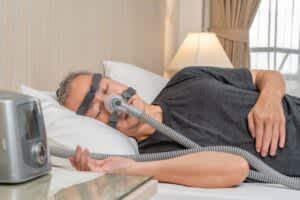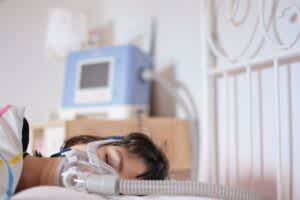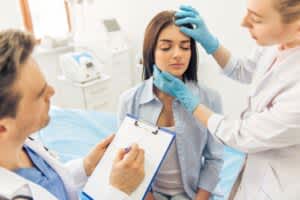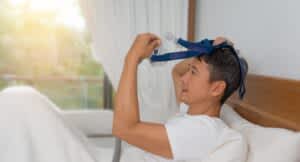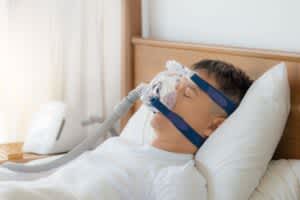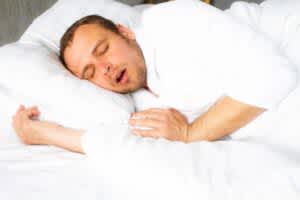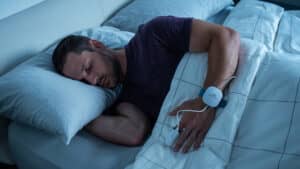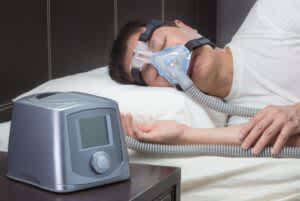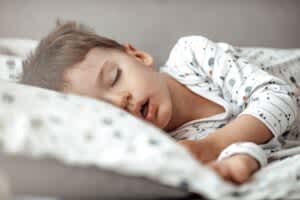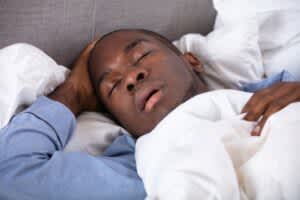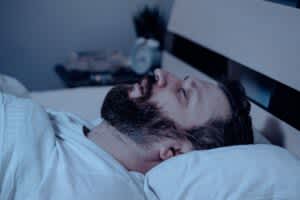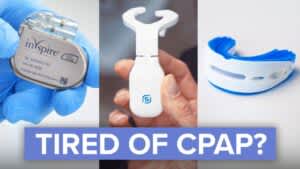Sleep apnea is a disorder in which a person’s breathing temporarily decreases or stops while they sleep. People with sleep apnea have many episodes of abnormal breathing during a night of sleep and may not get the oxygen that their body needs. As a result, people with sleep apnea often do not get restful sleep and are tired during the day.
Untreated sleep apnea can also lead to serious health consequences. To reduce the risk of side effects and long-term health consequences, it is important for people with symptoms of sleep apnea to talk to their doctor. We take a closer look at sleep apnea, including how this condition is diagnosed and treated, as well as tips for living with this sleep disorder.
Key Takeaways
- Sleep apnea is a potentially serious sleep disorder where breathing repeatedly stops and starts.
- Obstructive sleep apnea is the most common type, often identified by loud snoring and fragmented sleep.
- Diagnosis typically involves a sleep study conducted in a sleep lab or at home.
- Treatment options include CPAP therapy, oral appliances, surgery, and lifestyle changes.
Types of Sleep Apnea
There are three types of sleep apnea: obstructive sleep apnea, central sleep apnea, and mixed sleep apnea. The type of sleep apnea is diagnosed based on the cause of a person’s breathing disruptions.
Obstructive Sleep Apnea (OSA): OSA occurs when a person’s airway becomes partially or completely blocked repeatedly while they sleep, causing their breathing to become abnormally shallow or absent. Airway blockages may be caused by structures in the throat, excess weight in the face or neck, or other changes that constrict the airway. About 10% to 30% of adults in the United States have obstructive sleep apnea.
Central Sleep Apnea (CSA): CSA is caused by an issue in a part of the brain called the brain stem, which controls a person’s breathing. Problems in the brain stem trigger the sleeper’s respiration to slow or stop for brief periods. Central sleep apnea is less common than OSA, affecting less than 1% of people.
Some people experience symptoms of both CSA and OSA, a condition called mixed sleep apnea. Because episodes of mixed sleep apnea typically begin as OSA, this condition is treated like OSA.
Sleep Apnea Symptoms
The symptoms of sleep apnea depend on the type of sleep apnea a person is experiencing. However, some commonly shared symptoms include:
- Excessive daytime sleepiness or napping at inappropriate times
- Disrupted sleep and frequent nighttime waking
- Waking up with a headache
- Difficulties with concentration
Symptoms associated with just obstructive sleep apnea include:
- Snoring loudly
- Waking up gasping or making choking sounds
- Dry mouth in the morning
- Getting out of bed to urinate several times
In general with sleep apnea, people may not notice symptoms until they are pointed out by someone who sees the person sleep. Caregivers or bed partners may notice that a sleeper’s breathing gets slower, faster, or stops while they are asleep.
Does Snoring Mean You Have Sleep Apnea?
Snoring is common, and does not necessarily mean that you have sleep apnea. There are many other causes of snoring, including nasal congestion, pregnancy, and drinking alcohol before bed.
Almost everyone snores on occasion. Snorers who do not have sleep apnea rarely wake up due to snoring or difficulty breathing. People with sleep apnea tend to snore loudly and continuously, and they often wake up choking or gasping for air. Their snoring may be loud enough to be heard through walls and doors.
When to See a Doctor
A doctor can determine if a person’s symptoms are a result of sleep apnea or a different health condition. Several symptoms of sleep apnea, like daytime sleepiness and snoring, can also be caused by other conditions. Doctors should be notified if new symptoms develop or if current symptoms worsen. Depending on the results of an evaluation, a doctor may suggest undergoing additional testing or working with a sleep specialist.
Worried You May Have Undiagnosed Sleep Apnea?
Answer three questions to understand if you should be concerned.
What Causes Sleep Apnea?
Research has found several factors that can increase a person’s risk of developing obstructive or central sleep apnea.
Risk Factors for Obstructive Sleep Apnea
There are multiple risk factors for obstructive sleep apnea.
- Age: A person’s chances of developing OSA goes up as they get older, reaching its peak in their 60s and 70s.
- Sex: OSA is generally more common in men or people assigned male at birth.
- Body weight: A person’s likelihood of developing OSA increases as they gain weight. Nearly 60% of moderate to severe cases of OSA are related to obesity.
- Anatomical features: Physical differences like an abnormal or small jaw, enlarged tonsils, or the shape of a person’s face may increase their chance of having OSA.
- Health conditions: Health issues related to the heart or kidneys, as well as certain conditions that affect hormone levels, increase the likelihood of developing sleep apnea.
- Substance use: People who use tobacco products and consume alcohol are more at risk of OSA.
Risk Factors for Central Sleep Apnea
Central sleep apnea has some of the same risk factors as obstructive sleep apnea, but it is also associated with certain health conditions and other factors.
- Health conditions: CSA can be caused by an infection or injury to the brain stem, a stroke, kidney or heart failure, or an overproduction of growth hormones.
- Age: Symptoms of CSA are more common in people over the age of 65.
- Sex: Men or people assigned male at birth are at a higher risk of CSA.
- Use of certain drugs: Certain medications can increase the risk of CSA, including prescription and illicit opioids as well as some antidepressants.
- Being at high altitude: CSA can also be seen in otherwise healthy people when they spend time at high altitudes.
While men are at greater risk of sleep apnea, part of this difference may be attributed to the underdiagnosis of sleep apnea in women and people assigned female at birth. Differences in symptoms and perceived sleep quality are likely the reason behind this, frequently leading to the misdiagnoses of other conditions that commonly affect women.
Is Sleep Apnea Genetic?
Certain risk factors for obstructive sleep apnea are genetic. Compared to those without a family history of OSA, people who have an immediate relative with OSA are two times more likely to develop this condition. Researchers believe that patterns of OSA within families are at least partially linked to shared facial and body structure, as well as a family’s eating habits and patterns of physical activity.
Although there are no known genetic or familial factors involved in central sleep apnea, a genetic condition called congenital central hypoventilation syndrome may raise the risk of CSA.
Diagnosis of Sleep Apnea
In order to diagnose sleep apnea, a doctor or specialist will begin by collecting a detailed medical history and conducting a physical examination. Although a person’s medical history, symptoms, and the results of an exam can provide information about the likelihood of sleep apnea, a sleep study is needed to confirm the diagnosis.
The preferred type of sleep study for diagnosing sleep apnea is called polysomnography. During polysomnography, a technician places electrodes on various parts of the body to collect information about breathing, heart rate, body movements, sleep stages, and other changes that occur during sleep. The results of polysomnography are used to diagnose the type and severity of sleep apnea, and to develop a plan for treatment.
Sleep Apnea Testing at Home
Doctors may recommend a home sleep apnea test instead of a laboratory sleep study for people who are highly likely to have moderate to severe obstructive sleep apnea. Testing at home is not an option for people suspected of having central sleep apnea.
The benefits of testing for sleep apnea include the convenience and comfort of testing in a person’s home. Drawbacks for testing at home include fewer measurements compared to laboratory testing, which may increase the risk of misinterpreting test results.
Can Sleep Apnea Be Cured?
Sleep apnea is typically a chronic condition that cannot be cured. However, there are treatments available that can reduce or resolve symptoms and help people with sleep apnea improve both their sleep and overall health.
Treatment for Sleep Apnea
Treatment for central and obstructive sleep apnea is used to resolve breathing issues, reduce other symptoms, and decrease a person’s risk of developing health complications. OSA is managed as a chronic health condition and treatments differ based on the severity of the breathing disruptions and a person’s individual needs.
- Positive airway pressure: Positive airway pressure (PAP) is the most effective treatment for OSA. PAP devices keep a person’s airway open at night by using pressurized air pumped through a medical device and mask. Common types of PAP include continuous positive airway pressure (CPAP), auto-titrating positive airway pressure (APAP), and bilevel positive airway pressure (BiPAP) devices.
- Oral appliances: Oral appliances are helpful for some people with OSA. These devices keep the airway open by pushing the jaw forward or repositioning the tongue. A dentist or oral surgeon must select and fit the correct dental appliance for each individual.
- Medication: In December 2024, the Food and Drug Administration approved weight loss drug Zepbound to treat moderate to severe obstructive sleep apnea in patients with obesity. The medication is the first to be specifically approved for the treatment of OSA. The approval came after two clinical studies, funded by the drug’s manufacturer, Eli Lily, found that patients given tirzepatide (the active ingredient in Zepbound and Mounjaro) experienced 20-23.8 fewer respiratory events (breathing disruptions) per hour after 52 weeks versus patients given a placebo.
- Surgery: Surgery may be considered when a person does not respond to CPAP therapy or oral appliances, or when the airway obstruction is caused by a structure that can be surgically removed. Doctors may also implant a nerve-stimulating device that keeps the breathing passage open.
- Lifestyle changes: In addition to other treatments, doctors typically recommend lifestyle changes that can decrease OSA, such as dieting and exercise for people who are overweight, avoiding alcohol, and not sleeping on the back.
For people diagnosed with mild symptoms of CSA, treatment is typically directed at the underlying medical issue that is causing breathing disruptions. For severe CSA or symptoms that do not respond to treatment, a doctor may recommend a PAP device, supplemental oxygen during sleep, or medication.
Explore Your Treatment Options
Living With Sleep Apnea
Living with sleep apnea may require people to make significant changes to their lifestyle and daily routine. Excessive sleepiness can lead to drowsy driving, so people with sleep apnea should be cautious when driving long distances or operating machinery. Behavioral changes like losing weight, exercising, quitting smoking, and using a positive airway pressure all take time and a commitment to better health.
Although sleep apnea treatments like CPAP therapy can improve health and quality of life for most people with OSA, up to 40% of individuals do not use their CPAP device. On average, those who do use their sleep apnea machine do so for only four hours a night, which may be insufficient to experience the full benefits of therapy.
Fortunately, working closely with a doctor can help people living with sleep apnea to sleep better and experience meaningful improvements in their symptoms. A doctor can ensure that treatment is effective and monitor individuals for complications or other health conditions that could exacerbate breathing problems.
References
Ask the Sleep Doctor
Have questions about sleep? Submit them here! We use your questions to help us decide topics for articles, videos, and newsletters. We try to answer as many questions as possible. You can also send us an email. Please note, we cannot provide specific medical advice, and always recommend you contact your doctor for any medical matters.












